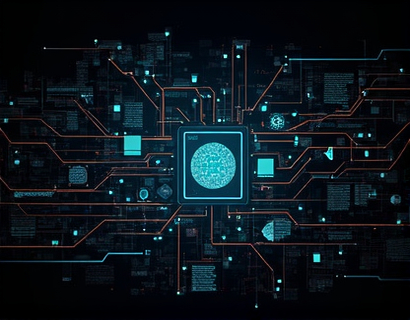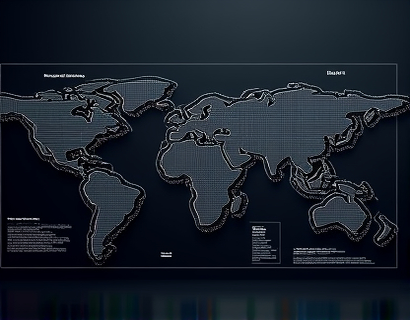Decentralized Corporation Software: A New Era for Business Registration
In the rapidly evolving landscape of business operations, the need for innovative solutions that enhance efficiency, security, and transparency has never been more critical. Traditional corporate registration processes are often cumbersome, prone to errors, and lack the necessary flexibility to adapt to the dynamic nature of modern businesses. Decentralized corporation software emerges as a transformative solution, offering a secure, efficient, and transparent approach to business registration and management. This article delves into the intricacies of this groundbreaking technology, exploring how it empowers entrepreneurs and reshapes the future of corporate governance.
Understanding Decentralized Corporation Software
Decentralized corporation software leverages blockchain technology to create a distributed ledger that records and verifies all aspects of corporate registration and operations. Unlike traditional centralized systems, which rely on a single authority to manage and validate data, decentralized systems distribute this responsibility across a network of nodes. This distribution ensures that no single point of failure exists, thereby enhancing the overall security and reliability of the system.
The core principle behind decentralized corporation software is the use of smart contracts. These self-executing contracts with the terms directly written into code automatically enforce and validate the rules and regulations required for corporate registration. Smart contracts eliminate the need for intermediaries such as legal firms and government agencies, reducing costs and streamlining the process.
Streamlining the Registration Process
One of the most significant advantages of decentralized corporation software is its ability to streamline the registration process. Traditional methods often involve a complex and time-consuming series of steps, including document preparation, submission, and approval. With decentralized software, these steps are automated and conducted on a secure, transparent ledger.
The process begins with the creation of a digital template for the corporation, which includes all necessary information such as business name, ownership structure, and compliance requirements. This template is then deployed on the blockchain, where it is verified by the network. Once verified, the corporation's details are immutably recorded, providing a permanent and tamper-proof record.
Entrepreneurs can initiate the registration process from anywhere in the world, using a simple and user-friendly interface. The software guides them through each step, ensuring that all required information is accurately and completely provided. This not only reduces the likelihood of errors but also significantly speeds up the registration process.
Ensuring Compliance and Regulatory Adherence
Compliance with local, national, and international regulations is a critical aspect of corporate operations. Decentralized corporation software addresses this challenge by integrating real-time regulatory updates and compliance checks into the registration process. Smart contracts can be programmed to reflect the latest legal requirements, ensuring that new corporations automatically adhere to current standards.
For existing businesses, the software can also facilitate ongoing compliance by monitoring changes in regulations and alerting the corporation to necessary updates. This proactive approach helps businesses avoid fines and legal issues, maintaining a strong and reputable standing in the market.
Enhancing Security and Data Integrity
Security is a paramount concern in any corporate environment, and decentralized corporation software offers robust solutions to protect sensitive information. The use of blockchain technology ensures that all data is encrypted and stored across multiple nodes, making it extremely difficult for unauthorized parties to access or alter the information.
Each transaction and update to the corporation's record is time-stamped and linked to the previous transaction, creating an unbreakable chain of evidence. This immutability not only safeguards against data breaches but also provides a transparent and auditable trail, enhancing trust and accountability.
Improving Accessibility and Collaboration
Decentralized corporation software significantly improves accessibility, allowing stakeholders to access and manage corporate data from anywhere with an internet connection. This is particularly beneficial for businesses with global operations or remote teams, as it ensures that all parties have real-time access to the most up-to-date information.
Collaboration is another area where decentralized software excels. Multiple stakeholders, including founders, investors, and board members, can collaborate on documents and decisions in a secure and transparent manner. Smart contracts can be used to automate voting processes and ensure that all decisions are made in accordance with the corporation's bylaws and regulations.
Case Studies and Real-World Applications
Several companies have already begun to adopt decentralized corporation software, achieving significant improvements in efficiency and security. For instance, a fintech startup used the platform to register its operations across multiple jurisdictions in a matter of hours, compared to the several months it would have taken through traditional means. The streamlined process allowed the startup to focus on product development and market expansion, rather than administrative tasks.
Another example is a non-profit organization that utilized the software to create a transparent and accountable structure for managing donations and expenditures. The immutable record of transactions provided donors with peace of mind, knowing that their contributions were being used as intended. This level of transparency not only enhanced the organization's reputation but also increased donor trust and support.
Challenges and Considerations
While the benefits of decentralized corporation software are clear, there are several challenges and considerations that businesses should be aware of. One of the primary concerns is the initial learning curve associated with adopting new technology. However, the user-friendly interfaces and comprehensive support provided by these platforms can mitigate this issue.
Another consideration is the regulatory landscape, which is still evolving in many regions. Businesses should stay informed about local and international regulations and ensure that their decentralized solutions comply with all relevant laws. Collaboration with legal experts and regulatory bodies can help navigate these complexities.
The Future of Corporate Management
The adoption of decentralized corporation software marks a significant shift in how businesses are formed and managed. As more companies recognize the advantages of this technology, the traditional models of corporate governance are likely to evolve. The combination of security, efficiency, and transparency offered by decentralized solutions will continue to drive innovation and transformation in the business world.
Entrepreneurs and business owners seeking decentralized solutions have the opportunity to be at the forefront of this revolution. By embracing decentralized corporation software, they can create and manage their businesses with greater ease, confidence, and integrity. The future of business registration is decentralized, and those who adapt will thrive in the new corporate landscape.









































